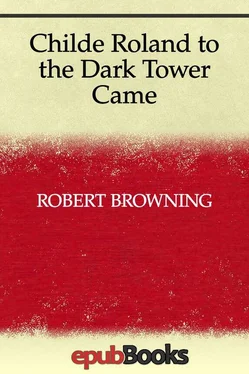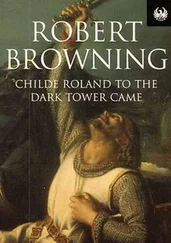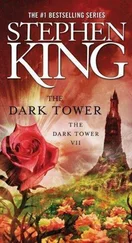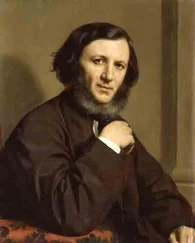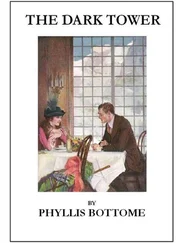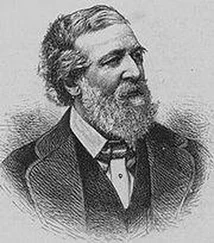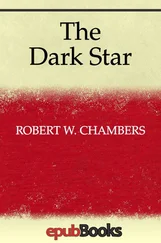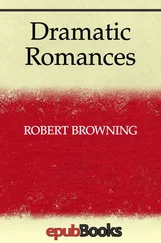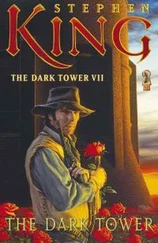Now patches where some leanness of the soil's
Broke into moss or substances like boils;
Then came some palsied oak, a cleft in him
Like a distorted mouth that splits its rim
Gaping at death, and dies while it recoils.
XXVII
And just as far as ever from the end!
Nought in the distance but the evening, nought
To point my footstep further! At the thought
A great black bird, Apollyon's bosom–friend,
Sailed past, nor beat his wide wing dragon–penned
That brushed my cap—perchance the guide I sought.
XXVIII
For, looking up, aware I somehow grew,
'Spite of the dusk, the plain had given place
All round to mountains—with such name to grace
Mere ugly heights and heaps now stolen in view.
How thus they had surprised me,—solve it, you!
How to get from them was no clearer case.
XXIX
Yet half I seemed to recognize some trick
Of mischief happened to me, God knows when—
In a bad dream perhaps. Here ended, then,
Progress this way. When, in the very nick
Of giving up, one time more, came a click
As when a trap shuts—you're inside the den!
XXX
Burningly it came on me all at once,
This was the place! those two hills on the right
Crouched like two bulls locked horn in horn in fight;
While to the left, a tall scalped mountain … Dunce,
Dotard, a–dozing at the very nonce,
After a life spent training for the sight!
XXXI
What in the midst lay but the Tower itself?
The round squat turret, blind as the fool's heart,
Built of brown stone, without a counterpart
In the whole world. The tempest's mocking elf
Points to the shipman thus the unseen shelf
He strikes on, only when the timbers start.
XXXII
Not see? because of night perhaps?—why, day
Came back again for that! before it left,
The dying sunset kindled through a cleft:
The hills, like giants at a hunting, lay,
Chin upon hand, to see the game at bay,—
"Now stab and end the creature—to the heft!"
XXXIII
Not hear? when noise was everywhere! it tolled
Increasing like a bell. Names in my ears
Of all the lost adventurers my peers,—
How such a one was strong, and such was bold,
And such was fortunate, yet each of old
Lost, lost! one moment knelled the woe of years.
XXXIV
There they stood, ranged along the hill–sides, met
To view the last of me, a living frame
For one more picture! in a sheet of flame
I saw them and I knew them all. And yet
Dauntless the slug–horn to my lips I set,
And blew. "Childe Roland to the Dark Tower came."
"Childe Roland" symbolizes the conquest of despair by fealty to the ideal. Browning emphatically disclaimed any precise allegorical intention in this poem. He acknowledged only an ideal purport in which the significance of the whole, as suggesting a vision of life and the saving power of constancy, had its due place. Certain picturesque materials which had made their impressions on the poet's mind contributed towards the building up of this realistic fantasy: a tower he saw in the Carrara Mountains; a painting which caught his eye later in Paris; the figure of a horse in the tapestry in his own drawing–room—welded together with the remembrance of the line cited from King Lear, iii. 4, 187, which last, it should be remembered, has a background of ballads and legend cycles of which a man like Browning was not unaware. For allegorical schemes of the Poem see Nettleship's "Essays and Thoughts," and The Critic, Apr. 24, 1886; for an antidote to these, The Critic, May 8, 1886; an orthodox view, Poet–lore, Nov. 1890: for interpretations touching on the ballad sources, London Browning Society Papers, part iii. p. 21, and Poet–lore, Aug.–Sept. 1892.
When Browning was asked by Rev. Dr. J.W. Chadwick whether the central idea of this poem was constancy to an ideal,—"He that endureth to the end shall be saved,"—he answered, "Yes, just about that."
4–5. =to afford suppression of=. To suppress.
11. ='gin write=. Write.
48. =its estray=. That is, Childe Roland himself.
66. =my prisoners=. Those who had met their death on the plain? Or, its imprisoned vegetation?
68. =bents=. A kind of grass.
70. =as=. As if.
91. =Not it!= Memory did not give hope and solace.
106. =howlet=. A small owl.
114. =bespate=. Spattered.
133. =cirque=. A circle or enclosure.
137. =galley–slaves= whom =the Turk=, etc.
140. =engine=. Machine.
143. =Tophet=. Hell.
160. =Apollyon=. The Devil.
Note the hero's mood of doubt and despair. At what point in his quest do we see him? What does he do after meeting the cripple? How does the landscape seem as he goes on? What moral quality does it seem to have? See lines 56–75. What new elements are introduced to add to the horror of the scene? What memories come to him of the failures of his friends? Was their disgrace in physical or moral failure? How does he come to find the Tower? Why does Browning represent it as a "dark tower"? Does his courage fail at the end of his quest? Or does he win the victory in finding the tower and blowing the challenge?
–THE END
